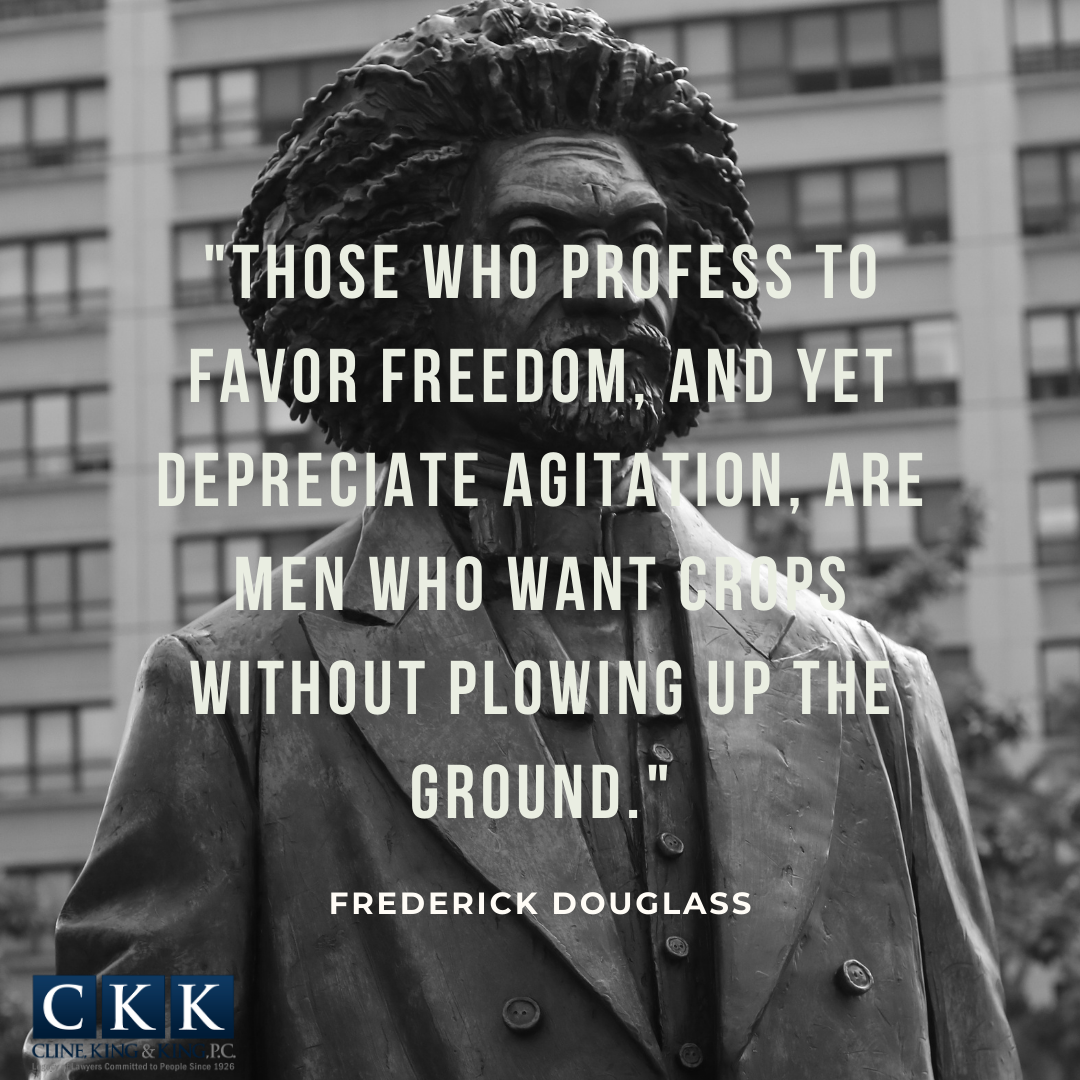Frederick Augustus Washington Bailey was born in February 1818, a slave who escaped from Maryland and became a national leader of the abolitionist movement in Massachusetts and New York. History knows him better as Frederick Douglass.

Douglass successfully escaped in 1838 by boarding a northbound train of the Philadelphia, Wilmington, and Baltimore Railroad, dressed in a sailor’s uniform provided by his future wife, Anna Murray, and carrying identification and protection papers he obtained from a free black seaman. He eventually reached a safe house in New York City. The entire journey took less than 24 hours. Douglass stated in a letter to a friend soon after reaching New York City, that he, “felt as one might feel upon escaping from a den of hungry lions.”
Once he arrived in New York, he sent for Anna and they were married on September 15, 1838, adopting the surname of Johnson to divert attention. Frederick and Anna later settled in Massachusetts. Their more famous surname, Douglass, was inspired by characters of Walter Scott’s poem, “The Lady of the Lake.”
Douglass was an incredible orator and incisive in his writings regarding anti-slavery. One of his best writings was in 1857 wherein he delivered a speech entitled, “West India Emancipation” in Canandaigua, New York. The following are highlights of this speech:
“I know, my friends, that in some quarters the efforts of colored people meet with very little encouragement. We may fight, but we must fight like the Sepoys of India, under white officers. This class of Abolitionists don’t like colored celebrations, they don’t like colored conventions, they don’t like colored antislavery fairs for the support of colored newspapers. They don’t like any demonstrations whatever in which colored men take a leading part. They talk of the proud Anglo-Saxon blood as flippantly as those who profess to believe in the natural inferiority of races…
Let me give you a word of the philosophy of reform. The whole history of the progress of human liberty shows that all concessions yet made to her august claims have been born of earnest struggle. The conflict has been exciting, agitating, all-absorbing, and for the time being, putting all other tumults to silence. It must do this or it does nothing. If there is no struggle there is no progress. Those who profess to favor freedom and yet deprecate agitation are men who want crops without plowing up the ground; they want rain without thunder and lightning. They want the ocean without the awful roar of its many waters.
This struggle may be a moral one, or it may be a physical one, and it may be both moral and physical, but it must be a struggle. Power concedes nothing without a demand. It never did and it never will. Find out just what any people will quietly submit to and you have found out the exact measure of injustice and wrong which will be imposed upon them, and these will continue till they are resisted with either words or blows, or with both.
The limits of tyrants are prescribed by the endurance of those whom they oppress. In the light of these ideas, Negroes will be hunted at the North and held and flogged at the South so long as they submit to those devilish outrages and make no resistance, either moral or physical. Men may not get all they pay for in this world, but they must certainly pay for all they get. If we ever get free from the oppressions and wrongs heaped upon us, we must pay for their removal. We must do this by labor, by suffering, by sacrifice, and if needs be, by our lives and the lives of others.”
In 1872 Douglass became the first African American nominated for Vice President of the United States, on the Equal Rights Party ticket. His running mate, Victoria Woodhull, was an equally progressive selection, the first female nominee for President of the United States.
In 1877 he visited his former owner Thomas Auld on the slaveowner’s deathbed at the behest of Auld’s daughter, a supporter of Douglass. While some criticized this move, it appeared to bring closure to Douglass. The same year he purchased his final home, which he and Anna named Cedar Hill. The home is now preserved as a national historic site.
Anna Douglass passed in 1882. Frederick married his second wife in 1884, Helen Pitts, a white suffragist and abolitionist from New York. The marriage caused controversy among both of their families, but Douglass responded to the criticisms by saying his first wife was the color of his mother and his second, the color of his father.
Through the rest of his life, Douglass continued his work, traveling and making a number of speeches even into his older years. Douglass spoke out against the separatist movement 1892 at a conference in Indianapolis. While speaking in Baltimore in 1894, Douglas stated, “I hope and trust all will come out right in the end, but the immediate future looks dark and troubled. I cannot shut my eyes to the ugly facts before me.”
With that comment, Douglass certainly predicted the future of race and equality issues in the United States.
On February 20, 1895 Douglass attended a meeting of the National Council of Women in Washington, D.C. where he received a standing ovation. That very evening he died of a massive heart attack at his home at the age of 77. Douglass’s contributions to the abolitionist movement have directly shaped the fabric of our society and the spirit of activism today.

